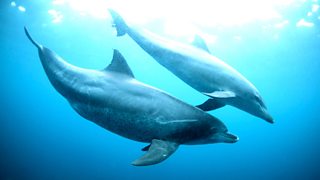The Hunt for the Gay Whale

The Hunt for the Gay Whale
Can animals be gay? Hermione Cockburn investigates the biologists who say they can.
It may sound like a bumper sticker slogan but a new generation of zoologists are hunting for gay whales - and ducks, penguins and otters. They are painstakingly recording examples of frottage, group sex, self pleasuring and aspects of sexual behaviour which owe more to Fellini than Johnny Morris.
Classic Darwinian theory posits that sexual activity is procreational in nature and serves the needs of evolution. Whilst human beings often have recreational sexual activity, this is seen as an anomalous result of human enculturation. Animal sex is seen as having one purpose: breeding.
To that end, Darwin dismissed or recategorised animal sexual behaviours which did not seem to meet the procreational model. If a male animal studded on another it was categorised as "dominance behaviour."
But a new generation of zoological enquiry aims to re-examine animal sexual behaviour and address the tricky issue of animal sexuality, a topic which is seen by some zoologists as simply anthropomorphism, human projection onto animal behaviour.
Joan Roughgarden, a professor of biology at Stanford University catalogued hundreds of varieties of what she categorises as "homosexual" behaviour amongst animals for her book Evolutions Rainbow. These include male big horn sheep who bond through genital licking and anal intercourse, or bottle nose dolphins who cavort in all male sexual groups. Roughgarden claims to have discovered regular same sex contact in 450 different species, proving, she says that homosexuality, far from being an anomalous condition which seems to be an evolutionary dead end, is an adaptive trait that has been carefully preserved by natural selection.
radio episodeDuration: 28 minsIt may sound like a bumper sticker slogan but a new generation of zoologists are hunting for gay whales - and ducks, penguins and otters. They are painstakingly recording examples of frottage, group sex, self pleasuring and aspects of sexual behaviour which owe more to Fellini than Johnny Morris.
Classic Darwinian theory posits that sexual activity is procreational in nature and serves the needs of evolution. Whilst human beings often have recreational sexual activity, this is seen as an anomalous result of human enculturation. Animal sex is seen as having one purpose: breeding.
To that end, Darwin dismissed or recategorised animal sexual behaviours which did not seem to meet the procreational model. If a male animal studded on another it was categorised as "dominance behaviour."
But a new generation of zoological enquiry aims to re-examine animal sexual behaviour and address the tricky issue of animal sexuality, a topic which is seen by some zoologists as simply anthropomorphism, human projection onto animal behaviour.
Joan Roughgarden, a professor of biology at Stanford University catalogued hundreds of varieties of what she categorises as "homosexual" behaviour amongst animals for her book Evolutions Rainbow. These include male big horn sheep who bond through genital licking and anal intercourse, or bottle nose dolphins who cavort in all male sexual groups. Roughgarden claims to have discovered regular same sex contact in 450 different species, proving, she says that homosexuality, far from being an anomalous condition which seems to be an evolutionary dead end, is an adaptive trait that has been carefully preserved by natural selection.
BBC
Comments